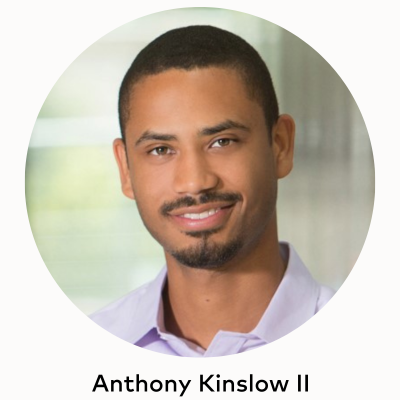Community catalyst: He’s sparking a clean energy revolution in Black communities
February 15, 2024 | By Maggie Sieger
After watching Al Gore’s groundbreaking environmental documentary “An Inconvenient Truth” as a junior in high school, Anthony Kinslow II decided to dedicate his life to fighting climate change. So after graduating from North Carolina A&T, he headed to Stanford University to obtain a Ph.D. in civil engineering.

At Stanford, he planned to learn how to build smarter, healthier and more efficient buildings. But when he looked around his sustainability seminars, Kinslow realized he was one of the few Black students pursuing a career in clean energy. He decided to help fix that, too.
“The Black community and many other minority communities have always been left behind when it comes to transformations in this country,” Kinslow says. “Climate change is one of those problems where everybody has to be involved. If large sections of America are marginalized, we’re not going to reach our goals.”
In 2016, Kinslow founded Gemini Energy Solutions, which performs energy audits to show businesses and organizations how they can save energy and money. Recently, he also developed software designed to enable nonprofits and small business owners in majority Black communities and rural areas to run energy audits themselves, freeing them from the need to find and pay auditors to learn how to improve sustainability in their buildings.
And to engage communities with education and access to sustainable energy solutions and his company’s software, he started with Black churches. “The Black church historically is a critical piece to any type of transition in the Black community,” Kinslow says. “I know from personal experience, Black churches are a hub for talent, social improvements and economic empowerment.”
Under the Inflation Reduction Act (IRA) of 2022, qualified houses of worship can receive funding to install clean energy projects, such as solar arrays, to offset their energy costs and carbon footprints. More importantly, the bill includes provisions to help houses of worship use their property to earn revenue from clean power generation. For instance, a church can install electric vehicle charging stations or build microgrids that benefit the wider neighborhood while bringing in income for things like job training or education programs.
Kinslow quickly developed partnerships with Black churches from California to New Jersey, including the mission-driven Green the Church, a sustainability initiative designed to tap into the power and purpose of the Black church community and expand the role of churches as centers for environmental and economic resilience.
“If we are going to move to a place where it is going to be clean energy, then we need to be the masters of our own fate,” says Rev. Ambrose Carroll Sr., pastor and founder of Green the Church.
But excitement about the hubs was tempered by the inability of most Black churches to secure financing for their projects, which is needed to supplement the IRA grants and tax credits. Too many banks have deemed the churches bad credit risks, despite decades of proven track records in their communities, Kinslow says.
So he has started trying to develop innovative loan programs by collaborating with organizations like the Kresge Foundation, which works to expand opportunities in America’s cities through grant making and social investing, and Clean Energy Works, which accelerates inclusive investments that open the clean energy economy to all. He’s working with these and other organizations to create a revolving loan fund for the clean energy hub projects.
To further boost new business development tactics, the entrepreneur last year joined Mastercard Start Path In Solidarity, the company’s startup engagement program for underrepresented founders and part of Mastercard’s larger In Solidarity commitment to help narrow the racial wealth and opportunity gap in America.
Start Path companies receive stage-relevant support, including enterprise partnership readiness training, a dedicated mentor, introductions to Mastercard customers and opportunities for technology collaboration. In turn, these startups keep a finger on the pulse on innovation and look around corners to help co-create what’s next in financial services. In addition, Kinslow’s company is integrating with the Mastercard Open Banking platform, which connects to more than 95% of deposit accounts in the U.S., in its efforts to develop a new financing platform that can both propel and streamline energy investments.
Kinslow is also busy building a talent pipeline to the clean energy industry. He’s visited historically Black colleges and universities — including N.C. A&T, which graduates more Black engineers than any other school in the country — to train students on his software and become energy auditors. His goal is to recruit more professionals from underrepresented communities into the industry, who in turn can act as ambassadors for clean energy in their own communities.
In the meantime, he is eagerly awaiting the opening of his first clean energy hub at a Black church in California later this year.
“There is so much potential,” he says, still exhibiting the enthusiasm of the newly minted environmentalist he was back in high school. “Clean energy hubs are just one piece of the puzzle, but they are a critical piece. We need community anchors in the Black community who have ownership of their clean technology, so others can follow the path they blaze.”